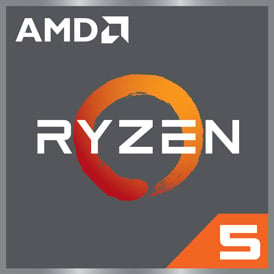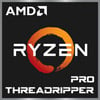
AMD Ryzen 5 8600G Benchmark, Test and specs
Last updated:
The AMD Ryzen 5 8600G has 6 cores with 12 threads and is based on the 6. gen of the AMD Ryzen 5 series. The processor uses a mainboard with the AM5 (LGA 1718) socket and was released in Q1/2024. The AMD Ryzen 5 8600G scores 1,947 points in the Geekbench 5 single-core benchmark. In the Geekbench 5 multi-core benchmark, the result is 10,638 points.

| Name: | AMD Ryzen 5 8600G |
|---|---|
| Family: | AMD Ryzen 5 (84) |
| CPU group: | AMD Ryzen 8000G (12) |
| Architecture: | Phoenix (Zen 4) |
| Segment: | Desktop / Server |
| Generation: | 6 |
| Predecessor: | AMD Ryzen 5 5600G |
| Successor: | -- |
CPU Cores and Base Frequency
The AMD Ryzen 5 8600G has 6 CPU cores and can calculate 12 threads in parallel. The clock frequency of the AMD Ryzen 5 8600G is 4.30 GHz (5.00 GHz). The number of CPU cores greatly affects the speed of the processor and is an important performance indicator.
| CPU Cores / Threads: | 6 / 12 |
|---|---|
| Core architecture: | normal |
| Cores: | 6x Zen 4 |
| Hyperthreading / SMT: | Yes |
|---|---|
| Overclocking: | Yes |
| Frequency: | 4.30 GHz |
| Turbo Frequency (1 Core): | 5.00 GHz |
| Turbo Frequency (6 Cores): | 4.75 GHz |
Artificial Intelligence and Machine Learning
Processors with the support of artificial intelligence (AI) and machine learning (ML) can process many calculations, especially audio, image and video processing, much faster than classic processors. Algorithms for ML improve their performance the more data they have collected via software. ML tasks can be processed up to 10,000 times faster than with a classic processor.
| AI hardware: | AMD Ryzen AI |
|---|---|
| AI specifications: | AMD dedicated AI XDNA Technology @ 16 TOPS |
Internal Graphics
The AMD Ryzen 5 8600G has integrated graphics, called iGPU for short. Specifically, the AMD Ryzen 5 8600G uses the AMD Radeon 760M, which has 512 texture shaders and 8 execution units. The iGPU uses the system's main memory as graphics memory and sits on the processor's die.
| GPU name: | AMD Radeon 760M |
|---|---|
| GPU frequency: | 0.80 GHz |
| GPU (Turbo): | 2.80 GHz |
| Compute units: | 8 |
| Shader: | 512 |
| Hardware Raytracing: | Yes |
| Release date: | Q1/2023 |
| Max. displays: | 4 |
|---|---|
| Generation: | 10 |
| Direct X: | 12 |
| Technology: | 4 nm |
| Max. GPU Memory: | 32 GB |
| Frame Generation: | AMD FSR |
Hardware codec support
A photo or video codec that is accelerated in hardware can greatly accelerate the working speed of a processor and extend the battery life of notebooks or smartphones when playing videos.
| h265 / HEVC (8 bit): | Decode / Encode |
|---|---|
| h265 / HEVC (10 bit): | Decode / Encode |
| h264: | Decode / Encode |
| VP8: | Decode |
| VP9: | Decode |
| AV1: | Decode / Encode |
|---|---|
| AVC: | Decode |
| VC-1: | Decode |
| JPEG: | Decode / Encode |
Memory & PCIeThe processor can use up to 256 GB memory in 2 (Dual Channel) memory channels. The maximum memory bandwidth is 83.2 GB/s. The memory type as well as the amount of memory can greatly affect the speed of the system. |
|
| Memory type: | Memory bandwidth: |
|---|---|
| DDR5-5200 | 83.2 GB/s |
| Max. Memory: | 256 GB |
| Memory channels: | 2 (Dual Channel) |
| ECC: | No |
| PCIe: | 4.0 x 20 |
| PCIe Bandwidth: | 39.4 GB/s |
Thermal ManagementThe thermal design power (TDP for short) of the processor is 65 W. The TDP specifies the necessary cooling solution that is required to cool the processor sufficiently. The TDP usually gives a rough idea of the actual power consumption of the CPU. |
|
|---|---|
| TDP (PL1 / PBP): | 65 W |
| TDP (PL2): | -- |
| TDP up: | -- |
| TDP down: | 45 W |
| Tjunction max.: | 95 °C |
Technical details
The AMD Ryzen 5 8600G is made in 4 nm. The smaller the manufacturing process of a CPU, the more modern and energy-efficient it is. Overall, the processor has 22.00 MB cache. A large cache can greatly speed up the processor's speed in some cases such as games.
| Technology: | 4 nm |
|---|---|
| Chip design: | Monolithic |
| Socket: | AM5 (LGA 1718) |
| L2-Cache: | 6.00 MB |
| L3-Cache: | 16.00 MB |
| AES-NI: | Yes |
| Operating systems: | Windows 10, Windows 11, Linux |
| Virtualization: | AMD-V, SVM |
|---|---|
| Instruction set (ISA): | x86-64 (64 bit) |
| ISA extensions: | SSE4a, SSE4.1, SSE4.2,FMA3, AVX2, AVX512 |
| Release date: | Q1/2024 |
| Release price: | 229 $ |
| Part Number: | 100-000001237 |
| Documents: | Technical data sheet |
Rate this processor
Benchmark results

The benchmark results for the AMD Ryzen 5 8600G have been carefully checked by us. We only publish benchmark results that have been created by us or that have been submitted by a visitor and then checked by a team member. All results are based on and fullfill our benchmark guidelines.
Screenshots:
Screenshots:
Cinebench 2024 (Single-Core)
The Cinebench 2024 benchmark is based on the Redshift rendering engine, which is also used in Maxon's 3D program Cinema 4D. The benchmark runs are each 10 minutes long to test whether the processor is limited by its heat generation.

|
Intel Core i5-12400
6C 12T @ 4.40 GHz |
||

|
Intel Core i5-12400F
6C 12T @ 4.40 GHz |
||

|
Intel Core i5-12500H
12C 16T @ 4.50 GHz |
||
|
|
AMD Ryzen 5 8600G
6C 12T @ 5.00 GHz |
||

|
AMD Ryzen 5 PRO 8600G
6C 12T @ 5.00 GHz |
||

|
AMD Ryzen 5 8500G
6C 12T @ 5.00 GHz |
||

|
Intel Core i5-12500T
6C 12T @ 4.40 GHz |
||
Cinebench 2024 (Multi-Core)
The Multi-Core test of the Cinebench 2024 benchmark uses all cpu cores to render using the Redshift rendering engine, which is also used in Maxons Cinema 4D. The benchmark run is 10 minutes long to test whether the processor is limited by its heat generation.

|
Apple M2 Pro (12-CPU 19-GPU)
12C 12T @ 3.50 GHz |
||

|
AMD Ryzen 7 7735HS
8C 16T @ 4.75 GHz |
||

|
AMD Ryzen 5 7500F
6C 12T @ 5.00 GHz |
||
|
|
AMD Ryzen 5 8600G
6C 12T @ 5.00 GHz |
||

|
AMD Ryzen 5 PRO 8600G
6C 12T @ 5.00 GHz |
||

|
AMD Ryzen 7 PRO 5750G
8C 16T @ 4.60 GHz |
||

|
AMD Ryzen 7 5700G
8C 16T @ 4.60 GHz |
||
Cinebench R23 (Single-Core)
Cinebench R23 is the successor of Cinebench R20 and is also based on the Cinema 4 Suite. Cinema 4 is a worldwide used software to create 3D forms. The single-core test only uses one CPU core, the amount of cores or hyperthreading ability doesn't count.

|
Intel Xeon w9-3495X
56C 112T @ 4.80 GHz |
||

|
Intel Core i5-13400
10C 16T @ 4.60 GHz |
||

|
Intel Core i5-13400F
10C 16T @ 4.60 GHz |
||
|
|
AMD Ryzen 5 8600G
6C 12T @ 5.00 GHz |
||

|
AMD Ryzen 5 PRO 8600G
6C 12T @ 5.00 GHz |
||

|
Intel Core i7-13620H
10C 16T @ 4.90 GHz |
||

|
Intel Core i7-1270P
12C 16T @ 4.80 GHz |
||
Cinebench R23 (Multi-Core)
Cinebench R23 is the successor of Cinebench R20 and is also based on the Cinema 4 Suite. Cinema 4 is a worldwide used software to create 3D forms. The multi-core test involves all CPU cores and taks a big advantage of hyperthreading.

|
AMD Ryzen 7 5700X
8C 16T @ 4.20 GHz |
||

|
AMD Ryzen 7 5700G
8C 16T @ 4.20 GHz |
||

|
AMD Ryzen 5 7500F
6C 12T @ 4.40 GHz |
||
|
|
AMD Ryzen 5 8600G
6C 12T @ 4.75 GHz |
||

|
AMD Ryzen 5 PRO 8600G
6C 12T @ 4.75 GHz |
||

|
AMD Ryzen 7 5800
8C 16T @ 4.00 GHz |
||

|
Intel Core i5-12500H
12C 16T @ 3.20 GHz |
||
Geekbench 5, 64bit (Single-Core)
Geekbench 5 is a cross plattform benchmark that heavily uses the systems memory. A fast memory will push the result a lot. The single-core test only uses one CPU core, the amount of cores or hyperthreading ability doesn't count.

|
Intel Core i5-13600K
14C 20T @ 5.10 GHz |
||

|
Intel Core i5-13600KF
14C 20T @ 5.10 GHz |
||

|
Intel Core i9-12900E
16C 24T @ 5.00 GHz |
||
|
|
AMD Ryzen 5 8600G
6C 12T @ 5.00 GHz |
||

|
AMD Ryzen 5 PRO 8600G
6C 12T @ 5.00 GHz |
||

|
Intel Core i7-13850HX
20C 28T @ 5.30 GHz |
||

|
Apple M2 Ultra (76-GPU)
24C 24T @ 3.50 GHz |
||
Geekbench 5, 64bit (Multi-Core)
Geekbench 5 is a cross plattform benchmark that heavily uses the systems memory. A fast memory will push the result a lot. The multi-core test involves all CPU cores and taks a big advantage of hyperthreading.

|
AMD Ryzen 9 6980HX
8C 16T @ 4.40 GHz |
||

|
Intel Xeon Gold 6130
16C 32T @ 2.60 GHz |
||

|
Intel Xeon W-1370
8C 16T @ 4.00 GHz |
||
|
|
AMD Ryzen 5 8600G
6C 12T @ 4.75 GHz |
||

|
AMD Ryzen 5 PRO 8600G
6C 12T @ 4.75 GHz |
||

|
AMD Ryzen 9 6900HX
8C 16T @ 4.20 GHz |
||

|
Intel Xeon Gold 6334
8C 16T @ 3.70 GHz |
||
Geekbench 6 (Single-Core)
Geekbench 6 is a benchmark for modern computers, notebooks and smartphones. What is new is an optimized utilization of newer CPU architectures, e.g. based on the big.LITTLE concept and combining CPU cores of different sizes. The single-core benchmark only evaluates the performance of the fastest CPU core, the number of CPU cores in a processor is irrelevant here.

|
Intel Core i7-13700
16C 24T @ 5.20 GHz |
||

|
Intel Core i7-13700F
16C 24T @ 5.20 GHz |
||

|
AMD Ryzen 7 7745HX
8C 16T @ 5.10 GHz |
||
|
|
AMD Ryzen 5 8600G
6C 12T @ 5.00 GHz |
||

|
AMD Ryzen 5 PRO 8600G
6C 12T @ 5.00 GHz |
||

|
Intel Core i9-12900KF
16C 24T @ 5.20 GHz |
||

|
AMD Ryzen 9 7845HX
12C 24T @ 5.20 GHz |
||
Geekbench 6 (Multi-Core)
Geekbench 6 is a benchmark for modern computers, notebooks and smartphones. What is new is an optimized utilization of newer CPU architectures, e.g. based on the big.LITTLE concept and combining CPU cores of different sizes. The multi-core benchmark evaluates the performance of all of the processor's CPU cores. Virtual thread improvements such as AMD SMT or Intel's Hyper-Threading have a positive impact on the benchmark result.

|
AMD EPYC 7453
28C 56T @ 3.25 GHz |
||

|
AMD EPYC 7302P
16C 32T @ 3.20 GHz |
||

|
AMD Ryzen Threadripper PRO 3945WX
12C 24T @ 4.20 GHz |
||
|
|
AMD Ryzen 5 8600G
6C 12T @ 4.75 GHz |
||

|
AMD Ryzen 5 PRO 8600G
6C 12T @ 4.75 GHz |
||

|
Intel Core i7-12700HL
14C 20T @ 3.80 GHz |
||

|
Intel Core i7-12700H
14C 20T @ 3.80 GHz |
||
Cinebench R20 (Single-Core)
Cinebench R20 is the successor of Cinebench R15 and is also based on the Cinema 4 Suite. Cinema 4 is a worldwide used software to create 3D forms. The single-core test only uses one CPU core, the amount of cores or hyperthreading ability doesn't count.

|
AMD Ryzen 7 8700G
8C 16T @ 5.10 GHz |
||

|
AMD Ryzen 7 PRO 8700G
8C 16T @ 5.10 GHz |
||

|
Intel Core i7-1280P
14C 20T @ 4.80 GHz |
||
|
|
AMD Ryzen 5 8600G
6C 12T @ 5.00 GHz |
||

|
AMD Ryzen 5 PRO 8600G
6C 12T @ 5.00 GHz |
||

|
Intel Core i7-12700HL
14C 20T @ 4.70 GHz |
||

|
Intel Core i7-12700H
14C 20T @ 4.70 GHz |
||
Cinebench R20 (Multi-Core)
Cinebench R20 is the successor of Cinebench R15 and is also based on the Cinema 4 Suite. Cinema 4 is a worldwide used software to create 3D forms. The multi-core test involves all CPU cores and taks a big advantage of hyperthreading.

|
AMD Ryzen 7 PRO 6860Z
8C 16T @ 2.70 GHz |
||

|
AMD Ryzen 9 6900HS
8C 16T @ 3.80 GHz |
||

|
AMD Ryzen 7 5700G
8C 16T @ 4.20 GHz |
||
|
|
AMD Ryzen 5 8600G
6C 12T @ 4.75 GHz |
||

|
AMD Ryzen 5 PRO 8600G
6C 12T @ 4.75 GHz |
||

|
AMD Ryzen 7 PRO 6850U
8C 16T @ 2.70 GHz |
||

|
AMD Ryzen 9 5900HS Creator Edition
8C 16T @ 4.20 GHz |
||
iGPU - FP32 Performance (Single-precision GFLOPS)
The theoretical computing performance of the internal graphics unit of the processor with simple accuracy (32 bit) in GFLOPS. GFLOPS indicates how many billion floating point operations the iGPU can perform per second.

|
AMD Ryzen 7 6800H
AMD Radeon 680M @ 2.20 GHz |
||

|
AMD Ryzen 7 6800U
AMD Radeon 680M @ 2.20 GHz |
||

|
AMD Ryzen 7 PRO 6850U
AMD Radeon 680M @ 2.20 GHz |
||
|
|
AMD Ryzen 5 8600G
AMD Radeon 760M @ 2.80 GHz |
||

|
AMD Ryzen 5 PRO 8600GE
AMD Radeon 760M @ 2.80 GHz |
||

|
AMD Ryzen 5 PRO 8600G
AMD Radeon 760M @ 2.80 GHz |
||

|
Apple M3 (8-GPU)
Apple M3 (8 Core) @ 1.40 GHz |
||
Estimated results for PassMark CPU Mark
Some of the CPUs listed below have been benchmarked by CPU-monkey. However the majority of CPUs have not been tested and the results have been estimated by a CPU-monkey’s secret proprietary formula. As such they do not accurately reflect the actual Passmark CPU mark values and are not endorsed by PassMark Software Pty Ltd.

|
Intel Xeon W-3235
12C 24T @ 4.00 GHz |
||

|
AMD Ryzen 7 PRO 5845
8C 16T @ 3.40 GHz |
||

|
AMD Ryzen 7 5800
8C 16T @ 4.00 GHz |
||
|
|
AMD Ryzen 5 8600G
6C 12T @ 4.75 GHz |
||

|
AMD Ryzen 5 PRO 8600G
6C 12T @ 4.75 GHz |
||

|
Intel Xeon W-2265
12C 24T @ 4.20 GHz |
||

|
Intel Xeon Gold 5218R
20C 40T @ 2.30 GHz |
||
CPU performance per watt (efficiency)
Efficiency of the processor under full load in the Cinebench R23 (multi-core) benchmark. The benchmark result is divided by the average energy required (CPU package power in watts). The higher the value, the more efficient the CPU is under full load.

|
Intel Core i9-13900H
18,760 CB R23 MC @ 87 W |
||

|
AMD Ryzen 7 7700
19,540 CB R23 MC @ 92 W |
||

|
AMD Ryzen 5 PRO 8600G
14,067 CB R23 MC @ 68 W |
||
|
|
AMD Ryzen 5 8600G
14,067 CB R23 MC @ 68 W |
||

|
AMD Ryzen 7 7800X3D
17,762 CB R23 MC @ 87 W |
||

|
AMD Ryzen 7 5700U
9,555 CB R23 MC @ 47 W |
||

|
Intel Core i5-1135G7
5,642 CB R23 MC @ 28 W |
||
Performance for Artificial Intelligence (AI) and Machine Learning (ML)
Processors with the support of artificial intelligence (AI) and machine learning (ML) can process many calculations, especially audio, image and video processing, much faster than classic processors. The performance is given in the number (trillions) of arithmetic operations per second (TOPS).

|
Apple M1 Ultra (48-GPU)
20C 20T @ 0.60 GHz |
||

|
Apple M1 Ultra (64-GPU)
20C 20T @ 0.60 GHz |
||

|
Apple A16 Bionic
6C 6T @ 3.46 GHz |
||
|
|
AMD Ryzen 5 8600G
6C 12T @ 4.30 GHz |
||

|
AMD Ryzen 7 PRO 8840U
8C 16T @ 3.30 GHz |
||

|
AMD Ryzen 5 PRO 8640HS
6C 12T @ 3.50 GHz |
||

|
AMD Ryzen 5 PRO 8645HS
6C 12T @ 4.30 GHz |
||
Benchmarks

Cinebench 2024 (SC)
272 entries
272 entries

Cinebench 2024 (MC)
271 entries
271 entries

Cinebench R23 (SC)
586 entries
586 entries

Cinebench R23 (MC)
565 entries
565 entries

Geekbench 5 (SC)
2,488 entries
2,488 entries

Geekbench 5 (MC)
2,461 entries
2,461 entries

Geekbench 6 (SC)
1,755 entries
1,755 entries

Geekbench 6 (MC)
1,703 entries
1,703 entries

Cinebench R20 (SC)
656 entries
656 entries

Cinebench R20 (MC)
604 entries
604 entries

FP32 SP (iGPU)
2,042 entries
2,042 entries

3DMark Timespy (iGPU)
516 entries
516 entries

PassMark CPU-Mark
2,392 entries
2,392 entries

CPU performance per watt (efficiency)
109 entries
109 entries

AI / ML Performance
119 entries
119 entries
Description of the processor
With the AMD Ryzen 5 8600G, AMD introduced a new APU for the AM5 socket at the beginning of January 2024. The AMD Ryzen 5 8600G has 6 CPU cores and can process up to 12 threads in parallel thanks to the support of "Simultaneous Multi-Threading" technology.Also available and new to the desktop area at this time is AMD Ryzen AI, which is supported by the AMD Ryzen 5 8600G. The NPU in the AMD Ryzen 5 8600G has a theoretical computing power of 16 TOPS.
The AMD Ryzen 5 8600G combines modern Zen 4 CPU cores with an equally modern integrated graphics unit, the AMD Radeon 760M. This is based on the AMD RDNA3 graphics architecture. Theoretically, this iGPU even supports ray tracing, but this is mostly irrelevant due to the insufficient performance.
In addition, AMDs frame generation (AMD FSR) has also been supported since January 2024, in which the graphics card calculates intermediate frames, which leads to significantly more FPS in computer games. The AMD Radeon 760M clocks at up to 2.8 GHz in the AMD Ryzen 5 8600G and achieves almost 2700 points in the graphics benchmark 3D Mark TimeSpy (Graphics). The theoretical FP32 computing power of the graphics card is just under 2.9 TFLOPS.
Up to 256 GB of RAM (DDR5-5200) can be installed in a system with the AMD Ryzen 5 8600G. At least two memory modules should be installed to operate the memory in dual-channel mode. The maximum memory bandwidth is 83.2 GB/s, although faster RAM outside the specification can also be used. Since the graphics unit benefits greatly from the memory speed, you should use DDR5-6000 or higher if possible.
Since the iGPU uses internal PCIe lines, the processor only supports PCIe 4.0 with a maximum of 20 lines instead of PCIe 5.0. This is still completely sufficient and does not currently represent a bottleneck.
Popular comparisons
back to index




